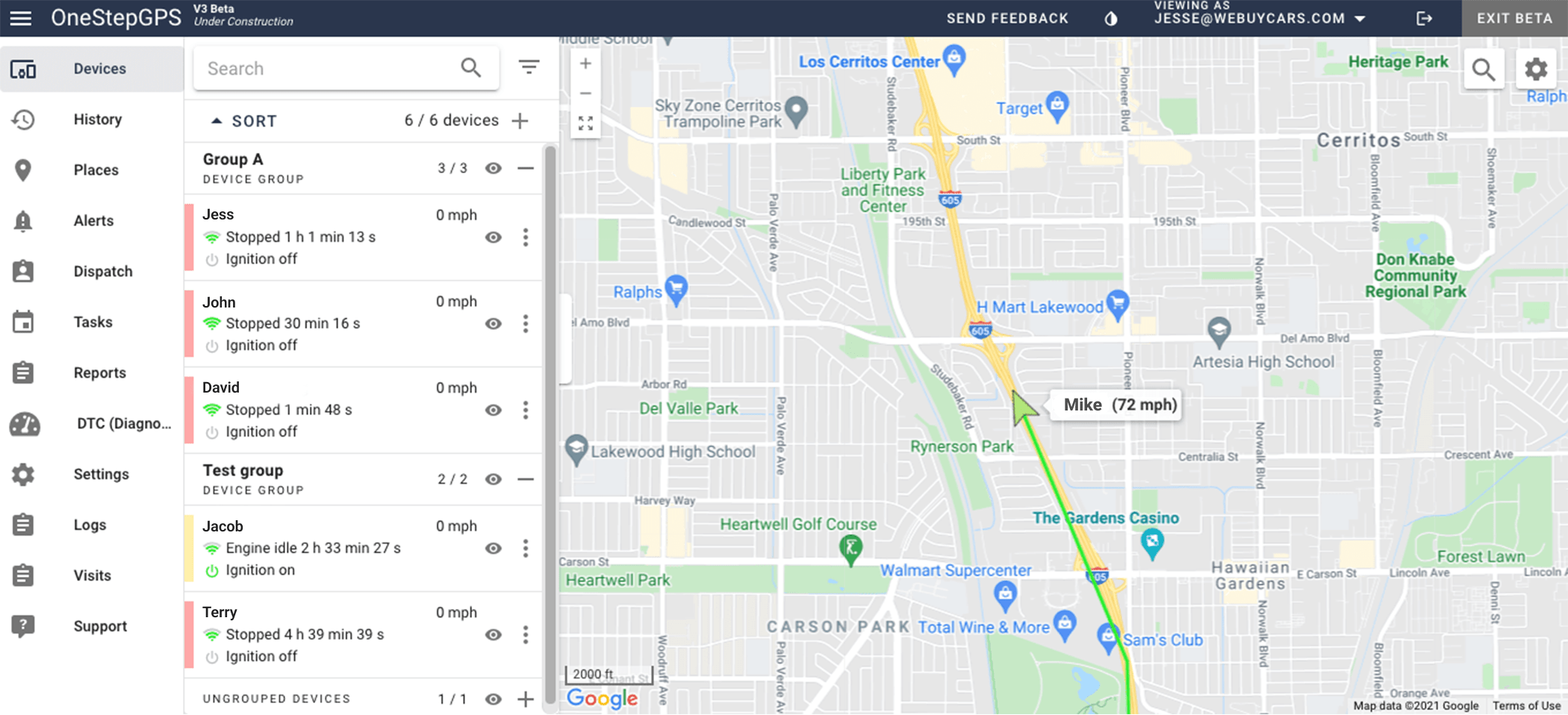Are There Any Privacy Concerns Or Legal Issues Related To Using GPS Tracking For Business Purposes?
Published on July 6th, 2023GPS tracking systems are indispensable for fleet management as employers monitor activities in the workplace. Fleet tracking systems use embedded IoT sensors for the collection of real-time data from the vehicles.
Fleet managers need to know the locations of vehicles, manage fuel costs, ensure drivers comply with safety policies, and provide accurate information to customers. Shippers monitor arrival time and conditions inside delivery vehicles. To meet growing customer demands, fleet managers rely on tracking systems for real-time visibility, more efficiency and cost savings.
GPS technology locates remote employees, optimizes routes, monitors engine performance and driver behaviors, enhances safety and efficiency, and ultimately increases the bottom line.
Recent studies show results from GPS tracking systems such as:
- Fuel economy + 20%
- Harsh-braking incidents - 75%
- Engine idle time - 60%
- Driving hours - 20%
- Safety incidents - 20%
- Driver compliance + 15%
The streamlined workflow and improved productivity with fleet GPS sound too good to be true. The results are genuine, but tracking raises concerns over privacy rights and legal compliance issues. Companies face fines, lawsuits, reputation, and brand damage if they fail to follow regulations and GPS fleet tracking best practices to safeguard employee privacy.
GPS Tracking for Business Purposes is Legal, But…
Globally, GPS tracking supports the supply chain at all levels. So, it must be legal, right? Yes, but there are specific GPS laws in the US. Employers must respect employee privacy rights and comply with the relevant local, state, and federal laws.
Federally, no specific law covers using GPS vehicle tracking systems for business purposes. The Electronic Communications Privacy Act (ECPA) is the closest policy that guides employers to ensure they avoid invading employee privacy. The ECPA protects wire, oral, and electronic communications while being made, in transit, and stored on computers. But the act is from 1986, so while it is general enough to cover most situations, it lacks anything like a specific mention of GPS fleet tracking systems.
GPS technology existed as early as the 1960s, with some implementation in the mid to late 1970s. But GPS as a fleet management system didn’t begin until 1978 when the Block-I GPS satellite was launched.
So, based on the ECPA, employers are prohibited from intentionally intercepting electronic communications unless:
- There is a legitimate business reason.
- They have received proper authorization in the form of the employee’s explicit consent.
Once collected, employers must implement appropriate security measures to protect data from unauthorized access or misuse.
GPS Tracker State Laws
Regulations vary from state to state. In most states, the limitations for GPS tracking are directly related to consent, vehicle ownership, and use during work vs. off times.
For example, in New York, employers can track company-owned vehicles but require specific consent if the employee owns the vehicle. Plus, New York employers can only monitor employee locations during business hours. In Connecticut, employers must provide employees with clear written notice.
Head over to the west coast, and in California, it is illegal for employers to track anyone without their consent, no matter who owns the vehicle.
So, employers need to check state laws and watch closely for changes in legislation.
Common Challenges for Fleet Owners Using a GPS Tracking System
Probably the most significant challenge for employers is employee morale and communication. Employees need to understand the methods and purposes fleet owners use GPS tracking for business purposes. Without clear communication, employers may encounter morale issues and even legal problems. When employees feel watched or micromanaged, they respond negatively, creating a workplace full of anxiety and distrust.
But employees who understand the benefits of a GPS tracking system, for themselves and their employer, contribute positively. When employees understand how GPS tracking enhances driver safety, communication, organization, and route management, morale improves, and turnover rates drop. Remote employees who see how the GPS tracking system provides them with greater independence feel more confident as they contribute to the organization’s goals. Employees view streamlined payroll and mileage reimbursement processes using fleet GPS very positively!
Establish Policies and Procedures
It’s a balancing act. GPS fleet tracking boosts efficiency but requires regulatory compliance. Fortunately, most companies have little trouble following industry best practices.
The GPS tracking system becomes part of the organization’s infrastructure with established policies and procedures. Everyone understands GPS tracking and privacy rights. Management and workers both clearly see the purpose and importance of the foundational policies.
Explaining the GPS Fleet Tracking Solution
Privacy concerns fade away when employees fully understand how the GPS fleet tracking solution works. Explain how location data is stored only during work hours to minimize employee concerns about invading their privacy and possible non-compliance risks.
The Collected Data
The tracking policies include details about the collected data and outline the conditions when the system will gather information.
Data Safety Systems
GPS data may include sensitive or personal employee information, so employer best practices include informing employees of the ongoing measures used to secure data and prevent misuse.
Access to Data
Employers must explain in the GPS system policy who can access employee data and why.
Data Retention
The policy describes how long the company keeps GPS data and what happens afterwards. If the plan is to destroy the data, how will the company do that, and when?
Discrimination
It should go without saying, but employers must not use GPS tracking to discriminate against employees. Doing so violates anti-discrimination laws and creates legal liability.
GPS tracking in the workplace brings significant benefits to employers and employees. Still, it is critical that employers follow best practices. Compliance with regulations supports employee rights but also provides a foundation for the improved efficiency tracking systems offer organizations.
Conclusion
In conclusion, GPS tracking provides significant benefits for fleet owners but has privacy and legal issues that must be addressed. Fleet owners must ensure tracking policies and procedures comply with relevant privacy and legal regulations. Transparent communications with employees on data collection and the use of tracking are vital, as is remaining ethical and responsible in the collection and use of data.
With the right approach, fleet owners can manage potential privacy concerns or legal issues related to using GPS tracking for business purposes while maximizing the efficiency of fleet operations.
 (888) 919-7536
(888) 919-7536


 Fleet Tracking
Fleet Tracking Trucking and ELD
Trucking and ELD Asset Tracking
Asset Tracking Battery Tracking
Battery Tracking





 Chat with us
Chat with us

